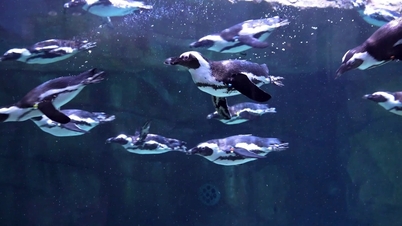Chimpanzees "drink" regularly in the wild
Chimpanzees are the primates closest to humans and have long been the subject of research in the fields of biology, evolution, and behavior.
Recently, a group of scientists at the University of California, Berkeley announced a remarkable discovery: chimpanzees regularly consume ethanol, the main ingredient in alcohol, through eating fermented fruit in their natural habitat in Africa.

A group of chimpanzees drinking fermented tree sap in the Nzerekore region, southeastern Guinea (Photo: The Guardian).
The average chimpanzee consumes about 14g of ethanol per day, equivalent to one standard American drink. If converted to body weight, this is equivalent to a 70kg adult drinking two glasses of wine per day.
What is remarkable is that this behavior appears in both males and females, and is spread across different regions, suggesting that this is not a random event.
Fruit samples were collected from two large reserves in Uganda and Côte d’Ivoire. Although the ethanol concentration per fruit is not high (only about 0.26%), with an average fruit intake of 4.5 kg per day, the alcohol consumption becomes significant.
No drunk, no addiction, but evolution?
Despite consuming significant amounts of alcohol, researchers did not observe any signs of drunkenness in the chimpanzees. This is thought to be because the ethanol is absorbed slowly throughout the day, combined with energy from the fruit, so it does not cause a sudden overload on the body.
This is seen by scientists as evidence to support the “drunken monkey hypothesis”, proposed by biologist Robert Dudley more than 10 years ago.
According to this hypothesis, human ancestors, who regularly ate fermented ripe fruit, developed the ability to metabolize alcohol, thereby forming an attraction to alcoholic beverages.
When it was first proposed, this theory was doubted. However, recent studies, especially this discovery, are making the hypothesis more widely accepted.
Alexi Maro, the study’s lead author, calls the phenomenon “evolutionary drunkenness,” a gentler and more accurate term than the original, curious but misleading “drunken monkey hypothesis.”
For the first time, he said, science has clear evidence that our closest evolutionary relatives are consuming alcohol at biologically meaningful levels, regularly and over the long term.
Can chimpanzees choose to drink alcohol?
One question is whether chimpanzees actively seek out fruits containing more alcohol, or simply eat whatever fruit they come across?
Previous studies have shown that some birds and primates prefer fermented nectar or fruit more than normal.
However, in this study, the authors have not yet determined the behavioral motives of chimpanzees, and are continuing to collect urine samples to analyze alcohol metabolism in their bodies.
In addition to biological factors, scientists are also expanding research on the social role of ethanol in herd life.
Alcohol may act as a mild stimulant, increasing bonding, improving appetite, or aiding energy intake. These effects, if proven, would open new avenues for understanding the links between ingestive behavior, social behavior, and primate evolution.
Professor Nathaniel Dominy, an anthropologist at Dartmouth College, called the study “a brilliant piece of work” and said it ended a long-running debate about whether wild fruits contain enough ethanol to affect animal behavior.
The fact that chimpanzees consume alcohol every day is not just an interesting wildlife fact. From an evolutionary perspective, this behavior may reveal something about the biological and cultural origins of humans.
New research suggests this attraction may have begun millions of years ago, with our common primate ancestors.
“We can learn a lot about ourselves by observing chimpanzees,” says Maro. “The preference for drinking is not a random habit, but may be part of a long evolutionary puzzle of humans.”
The team is now expanding their investigation to clarify the biological effects of long-term low-dose alcohol consumption in animals. These results could help to better understand metabolism, social behavior, and even the relationship between food and behavior in human evolutionary history.
Source: https://dantri.com.vn/khoa-hoc/tinh-tinh-biet-nhau-nhu-con-nguoi-dung-do-co-con-moi-ngay-20250925113131551.htm



![[Photo] National Assembly Chairman Tran Thanh Man chairs the 8th Conference of full-time National Assembly deputies](https://vphoto.vietnam.vn/thumb/1200x675/vietnam/resource/IMAGE/2025/9/29/2c21459bc38d44ffaacd679ab9a0477c)
![[Photo] Many streets in Hanoi were flooded due to the effects of storm Bualoi](https://vphoto.vietnam.vn/thumb/1200x675/vietnam/resource/IMAGE/2025/9/29/18b658aa0fa2495c927ade4bbe0096df)
![[Photo] General Secretary To Lam receives US Ambassador to Vietnam Marc Knapper](https://vphoto.vietnam.vn/thumb/1200x675/vietnam/resource/IMAGE/2025/9/29/c8fd0761aa184da7814aee57d87c49b3)

![[Photo] General Secretary To Lam attends the ceremony to celebrate the 80th anniversary of the post and telecommunications sector and the 66th anniversary of the science and technology sector.](https://vphoto.vietnam.vn/thumb/1200x675/vietnam/resource/IMAGE/2025/9/29/8e86b39b8fe44121a2b14a031f4cef46)























































































Comment (0)